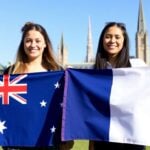Deadline: 17 December 2024
The U.S. Embassy Bangkok invites interested secondary school educators to apply to the Summer Study of the U.S. Institutes for Secondary School Educators 2025.
The program will take place over the course of five weeks beginning between late-May and early-June 2025. Study of the U.S. Institutes for Secondary Educators (SUSIs) are intensive post-graduate level academic programs that provide foreign secondary school educators and administrators the opportunity to deepen their understanding of U.S. society, culture, values, and institutions. The program goal is to strengthen curricula and to enhance the quality of teaching about the United States in secondary schools and other academic institutions abroad.
Study of the U.S. Institutes for Secondary Educators will take place at various academic institutions throughout the United States over the course of five weeks in summer 2025. Each Institute includes a four-week academic residency and, if conditions allow, a one-week integrated study tour in the United States.
Program Description
- The Study of the U.S. Institutes for Secondary Educators (SUSIs) will provide three multinational groups of 20 experienced secondary school educators (including secondary school teachers, administrators, teacher trainers, curriculum developers, textbook writers, Ministry of Education officials, and others) with a deeper understanding of U.S. society, education, and culture – past and present. The Institutes focus on providing content and materials for participants to develop high school level curricula about the United States. Two of the Institutes are tailored for secondary school teachers; please note that the Institutes for teachers focus on content and materials about the United States rather than teaching methods and pedagogy. The third Institute is tailored to experienced administrators, including teacher trainers, curriculum developers, textbook writers, Ministry of Education officials, and others.
- Through a combination of traditional, multi-disciplinary, and interdisciplinary approaches, program content will examine the history and evolution of U.S. institutions and values, broadly defined. The programs will also illuminate contemporary political, social, and economic debates in American society. The four-week academic residencies will take place at U.S. university and college campuses and will consist of a balanced series of lectures, panels, seminar discussions, readings, workshops, site visits, meetings with practitioners in the field, and cultural activities. Study tours will complement the academic residencies and showcase the cultural, geographic, and ethnic diversity of the United States. The program features curriculum based on the study of how America’s foundations and historical development have shaped and continue to inform U.S. politics, economics, and society. Community service activities are a key cultural component of the program and provide participants with a first-hand experience of how volunteerism plays a vital role in U.S. civil society. The program will offer multiple opportunities for follow-on engagement through alumni webinars, grant-funded follow-on projects, social media, and an alumni workshop.
- The University of Montana (UM) in Missoula, Montana, will oversee and administer the three SUSIs for Secondary Educators and will conduct one Institute for teachers which will explore the concept of the “American Dream”. The Institute for Training and Development (ITD) in Amherst, Massachusetts, will conduct the second Institute for teachers which will explore the nation’s progress and future. California State University, Chico will conduct the Institute for administrators and will focus on equitable learning communities, the history of local native people in the Northern California region, and U.S. democracy.
Benefits
- Program Funding: Through an award given to the University of Montana (UM), the Department of State will cover all participant costs, including program administration; travel allowances, domestic travel, and ground transportation; book, cultural, mailing and incidental allowances; and housing and subsistence; as well as arrange and pay for participants’ international and visa travel costs and travel allowances within set limits and in coordination with posts and Fulbright commissions.
- Housing and Meal Arrangements: When possible, each participant will have a private room with a shared bathroom during the residency portion (four weeks) of the Institute. However, private room accommodations are not guaranteed. During the study tour (one week), participants will likely share a hotel room with another participant of the same gender. During the residency, housing will typically be in college or university owned housing or nearby hotels. Most meals will be provided at campus facilities, though participants may have access to a kitchen to cook some meals on their own. All participants will be expected to respectfully share communal spaces and any necessary responsibilities.
- Special Accommodations: Care will be taken to ensure that any special requirements regarding diet, daily or weekly worship, housing, and medical care are satisfied. Special accommodations will be made available to the greatest extent possible. Should a participant need to quarantine due to health and safety concerns, accommodations will follow Centers for Disease Control and Prevention (CDC) and host institution guidelines.
- Travel Arrangements: The University of Montana (UM) will arrange and pay for international and visa travel for all Institutes. The host institution will provide each participant with a small travel allowance. The host institutions will arrange and cover the cost of any travel within the United States.
- Health Benefits: All participants will receive the Department of State’s Accident and Sickness Program for Exchanges (ASPE) health benefit, which provides coverage of up to $100,000 with a $25 co-pay per medical visit and a $75 co-pay per emergency room visit, for the duration of the program. Pre-existing conditions may be covered up to $100,000, subject to policy exclusions and limitations.
Program Requirements and Restrictions
- All participants are expected to participate fully in the program. Candidates should be made aware that they are applying for an intensive program and there will be little time for personal pursuits unrelated to the program. The Institute is not a research program. Participants must attend all lectures and organized activities and complete assigned readings. Family members and/or friends may not accompany participants on any part of the program. If the program is conducted virtually, the same participation requirements apply. Note that Institute curriculum will not formally address teaching methodology and pedagogical methods. Institutes focus on U.S. studies, with only a brief focus on the U.S. education system itself.
Eligibility Criteria
- Study of the U.S. Institutes for Secondary Educators are highly competitive. Priority will be given to candidates who have firm plans to enhance, update, or develop courses and/or educational materials with U.S. studies focus or component; who have no prior or limited experience in the United States; and who have special interest in the program subject areas as demonstrated through past scholarship, accomplishments, and professional duties.
- Candidates should be mid-career, typically between the ages of 30-50, highly motivated, experienced secondary school teachers and administrators whose students are approximately 14-18 years of age.
- Ideal candidates come from institutions seeking to introduce aspects of U.S. studies into their curricula, to develop new courses in the Institute subject, to enhance and update existing courses on the United States, or to offer specialized seminars/workshops for professionals in U.S. studies areas related to the program theme. While the nominees’ scholarly and professional credentials are an important consideration, the potential impact and multiplier effect from their participation in the Institute is equally important. Ideal candidates will have little or no prior experience living in or visiting the United States.
- As noted above, candidates must demonstrate English language fluency. Institutes are rigorous and demanding academic programs conducted entirely in English. Participants will be expected to read and comprehend substantial written materials and assignments in English and to fully and actively participate in all seminar and panel discussions. English fluency is vital to a successful experience in the Institute, for participants as individuals and to foster a cohesive and interactive group.
- Candidates should be willing and able to fully take part in an intensive post-graduate level academic program.
- U.S. citizens and permanent residents (green card holders) are not eligible for these programs.
- Relatives of U.S. Embassy or Fulbright commission employees are not eligible for SUSIs.
- Candidates must be willing to respectfully engage with fellow participants representing different backgrounds and different points of view.
Language
- All candidates must be proficient in English so that they can actively participate in the academic program. Host institutions will take into account that the level of comprehension and speaking ability of participants may vary and will prepare lectures and discussions that meet the highest academic standards while using language appropriate for participants who English as a second or third language.
For more information, visit U.S. Embassy & Consulate in Thailand.


























